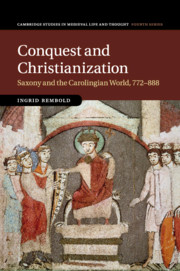
-
Select format
-
- Publisher:
- Cambridge University Press
- Publication date:
- December 2017
- December 2017
- ISBN:
- 9781108164597
- 9781107196216
- 9781316647202
- Dimensions:
- (228 x 152 mm)
- Weight & Pages:
- 0.6kg, 292 Pages
- Dimensions:
- (229 x 152 mm)
- Weight & Pages:
- 0.35kg, 296 Pages
You may already have access via personal or institutional login
Book description
Following its violent conquest by Charlemagne (772–804), Saxony became both a Christian and a Carolingian region. This book sets out to re-evaluate the political integration and Christianization of Saxony and to show how the success of this transformation has important implications for how we view governance, the institutional church, and Christian communities in the early Middle Ages. A burgeoning array of Carolingian regional studies are pulled together to offer a new synthesis of the history of Saxony in the Carolingian Empire and to undercut the narrative of top-down Christianization with a more grassroots model that highlights the potential for diversity within Carolingian Christianity. This book is a comprehensive and accessible account which will provide students with a fresh view of the incorporation of Saxony into the Carolingian world.
Reviews
'Offers a laudably clear and nuanced study that will offer stronger foundations for the subject going forward, and hopefully connect developments in Saxony more fully with those being studied elsewhere in the Carolingian world. … anyone wishing to study the regional diversity of the Carolingian world in future, or indeed processes of conquest and conversion, will appreciate the clarity and detail of Rembold's work.'
James T. Palmer Source: The Medieval Review
'Elegantly bringing together political and ecclesiastical strands … [Rembold] presents us with ‘a case study of social transformation’ … [Her] study is sure to play an important role in future discussions about Saxons in the Carolingian world.'
Lutz E. von Padberg Source: German Historical Institute London Bulletin
'Rembold’s valuable study contributes to our understanding of diversity in early medieval Christian practice and Carolingian history generally. Her work gives us much to ponder and will doubtlessly shape future studies of early medieval Germany.'
Matthew Bryan Gillis Source: Speculum
‘Rembold’s study brings together core texts, and offers a conventional account of the conversion of the Saxons, which is of use for Anglophone readers.’
Carole M. Cusack Source: Journal of the Australian Early Medieval Association
Contents
Metrics
Altmetric attention score
Full text views
Full text views help Loading metrics...
Loading metrics...
* Views captured on Cambridge Core between #date#. This data will be updated every 24 hours.
Usage data cannot currently be displayed.
Accessibility standard: Unknown
Why this information is here
This section outlines the accessibility features of this content - including support for screen readers, full keyboard navigation and high-contrast display options. This may not be relevant for you.
Accessibility Information
Accessibility compliance for the PDF of this book is currently unknown and may be updated in the future.


